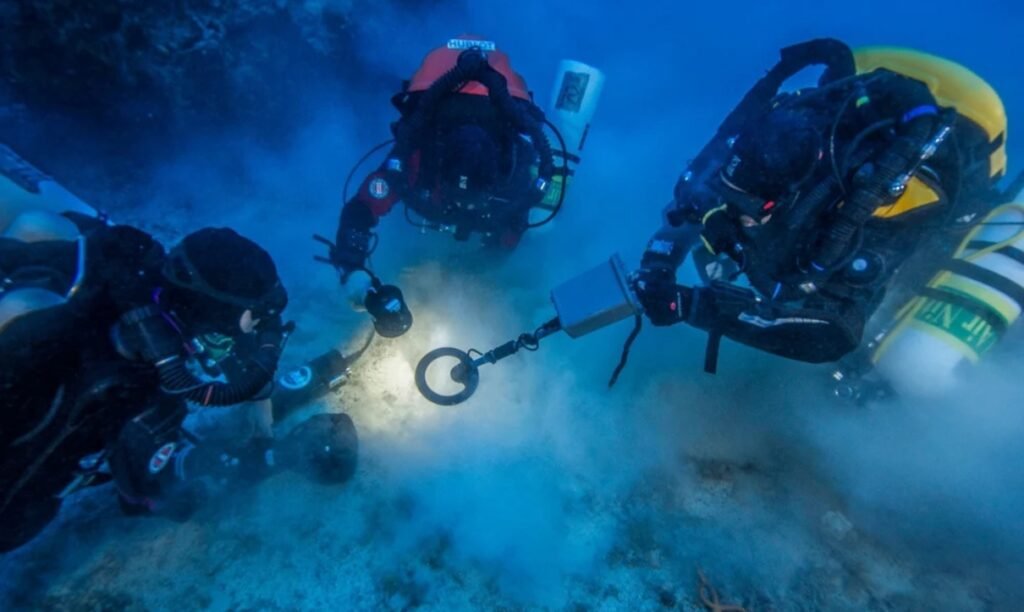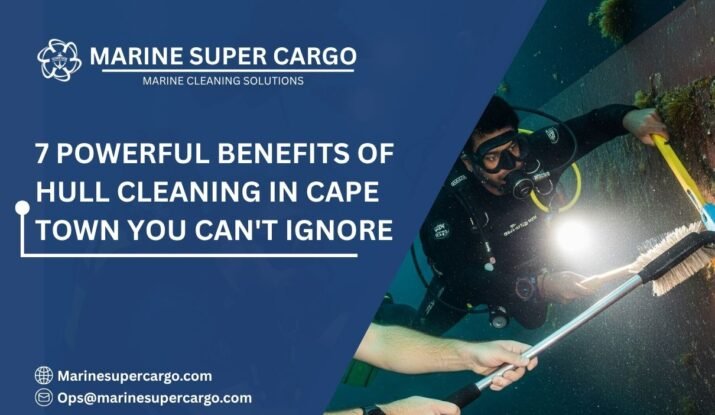What Is Hull Cleaning in Cape Town and Why Is It Important?
Hull cleaning in Cape Town involves removing marine growth such as barnacles, algae, and slime from a ship’s underwater surfaces. These organisms create drag, forcing engines to work harder, burn more fuel, and emit higher greenhouse gases.
Think of it like running with sticky mud on your shoes—slowing you down and wasting energy. Regular hull cleaning keeps the vessel smooth, improves speed, reduces fuel consumption, lowers emissions, and enhances overall efficiency, making it an essential practice for sustainable and cost-effective maritime operations.
How Hull Cleaning in Cape Town Boosts Fuel Efficiency
A clean hull allows a ship to move through water with minimal resistance, reducing engine workload and fuel consumption. Even a thin layer of biofouling—barnacles, algae, or slime—can increase fuel use by up to 40%, driving up operational costs.
Regular hull cleaning in Cape Town ensures vessels maintain optimal hydrodynamics, improving speed, lowering fuel expenses, and making voyages more cost-effective. By investing in professional underwater hull maintenance, shipowners enhance performance, save on fuel, and support sustainable, environmentally responsible maritime operations.

Environmental Impact: Cleaner Hulls, Healthier Oceans
Removing biofouling from ship hulls not only improves performance but also protects marine ecosystems. It prevents the spread of invasive species between ports and reduces friction, lowering fuel consumption and carbon emissions. Regular hull cleaning helps vessels comply with IMO and MARPOL environmental standards. Many service providers now employ eco-friendly technologies, including debris capture systems and non-toxic cleaning methods, to minimize pollution during maintenance. By keeping hulls clean, shipowners contribute to healthier oceans while supporting sustainable and responsible maritime operations. Read more about Underwater Hull Cleaning in Freetown.
Types of Hull Cleaning in Cape Town: In-Water vs. Dry-Dock
Hull cleaning in Cape Town is performed using two primary methods: in-water cleaning and dry-dock cleaning. In-water cleaning occurs while the ship remains afloat, offering a faster, more cost-effective solution ideal for routine maintenance.
Dry-dock cleaning involves lifting the vessel out of the water, allowing for deep cleaning, repairs, and coating inspections. Both methods are essential in Cape Town’s busy port operations, helping shipowners maintain vessel performance, reduce fuel consumption, and ensure compliance with environmental and safety standards. Learn more about Underwater Ship hull cleaning in Elizabeth.
Hull Cleaning Permits and Regulations in Cape Town Ports
To conduct hull cleaning in Cape Town ports, shipowners must obtain a Harbor Master permit. This regulatory requirement ensures that cleaning operations are carried out safely, sustainably, and without interfering with port activities.
Compliance involves submitting proper documentation, adhering to environmental guidelines, and following approved safety protocols. By securing the necessary permits and following regulations, operators protect both their vessels and the port environment, maintain smooth operations, and meet local and international maritime standards while performing efficient and responsible underwater hull maintenance. Read more about Underwater Ship hull cleaning in East London.
Cost-Effective Hull Cleaning in Cape Town Saves More Than Money
Regular hull cleaning reduces fuel costs, extends the life of your ship’s coating, and prevents costly repairs from corrosion. It’s like oil changes for your car – small investments upfront help avoid expensive breakdowns down the line.
Future Trends: Advances in Hull Cleaning Technology
The future of hull cleaning in Cape Town is being transformed by cutting-edge technologies like remotely operated underwater vehicles (ROVs) and robotic cleaning systems. These innovations allow ships to maintain clean hulls more efficiently, safely, and sustainably.
Automated and precision-controlled cleaning minimizes the need for harmful chemicals, reduces environmental impact, and ensures minimal disruption to port schedules. By adopting these advanced solutions, shipowners can enhance vessel performance, lower fuel costs, and meet stricter environmental and regulatory standards while keeping fleets operational and compliant. Learn more about Underwater Ship hull cleaning in Durban.
✅ 4 Things to Check for Safety at Sea pic.twitter.com/dAxhJQ2i6U
— Marine Super Cargo (@Marinsupercargo) September 14, 2025
Marine Supercargo Expands Services: Drug & Alcohol Testing for Safer Seas
Marine Supercargo, renowned for their global marine cleaning platform, now offers Drug & Alcohol Testing services. These professional tests help ship owners, operators, and managers maintain crew safety, comply with international maritime regulations, and boost operational efficiency. Ensuring your team stays fit for duty reduces accidents at sea and upholds the highest standards of maritime safety. Also read about Underwater Ship hull cleaning in Cape Town.
How Hull Cleaning Protects Your Vessel’s Hull and Propellers
Biofouling not only slows ships but also damages hull coatings and corrodes metal components, including propellers. Over time, this can lead to higher maintenance costs and reduced operational efficiency.
Regular hull cleaning preserves the integrity of hull paint, prevents corrosion, and ensures optimal propulsion performance. By maintaining clean, well-protected surfaces, shipowners safeguard critical vessel components, extend the lifespan of their fleet, and promote safer, more efficient voyages, all while supporting environmental compliance and cost-effective maritime operations.

Practical Tips for Ship Owners in Cape Town on Hull Maintenance
- Schedule regular hull inspections every few months
- Choose eco-certified cleaning providers who use waste capture systems
- Plan hull cleaning around port schedules to minimize downtime
- Keep records of cleaning and maintenance for compliance and audits
Conclusion: Keep Your Cape Town Vessel Shipshape
Hull cleaning in Cape Town offers clear benefits: increased fuel efficiency, compliance with environmental laws, and cost-effective maintenance. Incorporate regular cleaning into your ship’s routine and leverage new technologies emerging in the sector. Don’t forget that Marine Supercargo’s new drug and alcohol testing services also contribute to safe, regulation-compliant sea operations. For expert hull services and crew safety solutions, CleanShip.co is a trusted resource ready to support your maritime needs. Keep your ship sailing smoothly and sustainably!
FAQs:
Q1. Why is drug and alcohol testing critical on ships?
Testing helps prevent accidents caused by impaired crew, ensures compliance with international maritime regulations, and maintains safe working environments on board. Random testing acts as a deterrent, too.
Q2. What are the environmental regulations related to hull cleaning?
Hull cleaning must comply with the IMO’s guidelines and MARPOL conventions to avoid polluting marine habitats and spreading invasive species. Permits and approved methods ensure eco-friendly practices.
Q3. How often should I clean my ship’s hull in Cape Town?
In warm waters like Cape Town, hull cleaning every 2-3 months keeps biofouling under control, preserving fuel efficiency and avoiding severe fouling buildup.
Q4. Can in-water hull cleaning fully replace dry-dock cleaning?
No, in-water cleaning is great for regular maintenance, but dry-dock cleaning is essential for deep cleaning, repairs, and recoating the hull for long-term durability.
Q5. What technologies are leading hull cleaning innovation?
Robotic cleaners, ROVs, biodegradable cleaning agents, and full debris capture systems are among the advances making hull cleaning safer, more efficient, and environmentally responsible.


